Advertisement
Soak Up Serenity
Create an at-home bathing oasis

Baby, it’s cold outside! Plus, between holidays, friends, and family obligations, this time of year finds many of us at our most frazzled. Whether you need to warm up after a frolic in the cold or reward yourself after a stressful day, nothing beats the warm, indulgent comfort of a bath. Go ahead—treat yourself to some “me” time.
Advertisement
Bathing benefits
From mineral springs to hot baths, ancient Greek, Roman, Celtic, and Egyptian cultures all used water for healing purposes. Some scientists believe that using water as therapy is as old as humankind itself.
Now, it looks like contemporary scientists are starting to shine a light on the benefits of bathing. Much of the research on water therapy focuses on therapeutic treatments rather than at-home baths. Nevertheless, here are some of the findings from recent research.
- Water therapy is thought to help ease the pain of fibromyalgia.
- Warm water bathing has been shown to improve cardiac function in patients with chronic heart failure.
- Bathing has been shown to help reduce labour pain in pregnant women.
- Footbaths may help stimulate the relaxation response and reduce stress.
Of course, some of these results come as no surprise—who doesn’t love a footbath?—but they do serve as a reminder that taking some time for ourselves can make a big difference in our emotional and physical well-being.
Advertisement
A trusty tub tool kit
Time to toss those expired bubble baths and grungy sponges. Instead, stock up on some eco-friendly and all-natural bath ingredients that can enhance a soak in the tub.
Oatmeal
Many of us remember oatmeal baths as a way to soothe chicken pox as children, but that’s not where their use should end! Oatmeal baths are famous and well documented for their ability to soothe itchy, inflamed skin.
Pick up colloidal oatmeal (very finely ground oats not intended for eating) at a health food store, or use plain uncooked oats to make a soothing oatmeal bath. You may also grind plain oats at home to create your own colloidal oatmeal. Add a handful to the bath, and soak for five to 10 minutes.
Epsom salts
Epsom salts aren’t actually salts, but rather naturally occurring compounds of the minerals magnesium and sulphate. They have myriad health and household uses, and are readily found at natural health stores.
Thought to help relieve tired, sore muscles and inflammation, an Epsom salt bath is a soothing way to end the day. Add 2 cups (500 mL) to bathwater and soak for 10 minutes.
Green tea
Green tea is well known for its antioxidant properties. In addition to reaping the health benefits of this much-loved beverage, many people swear by adding green tea to their baths. Add approximately six green tea bags to your bathwater, let them steep for 15 to 20 minutes, then remove the tea bags. Don’t be put off by the green colour of the bathwater—that’s perfectly normal.
Honey
Adding honey to bathwater results in a luxuriously fragrant, skin-softening soak. It’s more than just a lovely smell; honey helps skin retain moisture and boasts antibacterial properties. Pick up natural honey from your local health food store, and add 1/4 cup (60 mL) to your bathwater.
Bath oils
Bath oils help leave skin silky soft. Choose one with natural plant or nut oils, such as jojoba, almond, or coconut oil. Follow directions on the bottle—typically adding a few drops to a warm bath—but exercise caution when leaving the bath, as the tub might be slippery.
Natural bath bombs, soaks, and salts
Prepackaged natural bath salts and soaks, and delightfully fizzy bath bombs, are plentiful at natural health retailers.
Choose products with ingredients for your specific skin care needs and fragrance preferences, such as
- relaxing lavender oil or flowers
- energizing lemon, grapefruit, tangerine, or sweet orange essential oil
- calming camomile
- luxurious vanilla
- invigorating mint
- soothing oats
- purifying sea salt
- moisturizing almond oil
- wholesome milk
- nourishing vitamin E
Ensure the products you choose are free of artificial colours, preservatives, and fragrances. To use, follow the instructions on the package, as each product is slightly different.
Advertisement
What about bubble bath?
Good news for bubble lovers! Recent research has found that avoiding bubble baths may not be necessary for those who are prone to urinary tract infections. Plus, natural bubble bath products available at health food stores are usually made without sodium lauryl sulphate—a suspected skin irritant that’s common in foaming products.
Advertisement
Get glowing skin
Many exfoliating products, such as body scrubs, are designed for use in the shower. However, it’s possible to add exfoliation to your bathing ritual as well.
- To help soften skin, exfoliate before bathing by using a body brush. Pick up a body brush from your local natural health retailer, and use it to make long, sweeping strokes along your body toward the heart.
- Choose a moisturizing body wash infused with natural nut or vegetable oils to help soften dry winter skin.
- After bathing, apply a natural moisturizer immediately after patting your skin dry with a towel. Natural moisturizers are readily available at health food stores. To enhance your bathing ritual, choose one with a scent that you find relaxing, and make sure it doesn’t contain parabens or phthalates.
Advertisement
Think warm, not hot
Hot water not only can burn skin, but also makes dry skin worse. Experts suggest a bath temperature of no higher than 105 F (40.5 C). Remember, water should feel warm, not hot, to the touch.





